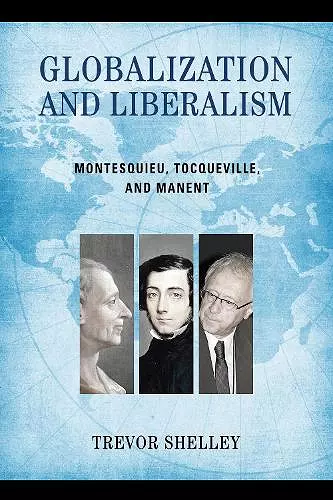Globalization and Liberalism
Montesquieu, Tocqueville, and Manent
Format:Hardback
Publisher:University of Notre Dame Press
Published:30th Apr '20
Currently unavailable, and unfortunately no date known when it will be back

In this learned and wide-ranging book, Trevor Shelley engages the controversial topic of globalization through philosophical exegesis of great texts. Globalization and Liberalism illustrates and defends the idea that at the heart of the human world is the antinomy of the universal and the particular. Various thinkers have emphasized one aspect of this tension over the other. Some, such as Rousseau and Schmitt, have defended pure particularity. Others, such as Habermas, have uncritically welcomed the intimations of the world state. Against these twin extremes of radical nationalism and antipolitical universalism, this book seeks to recover a middle or moderate position—the liberal position. To find this via media, Shelley traces a tradition of French liberal political thinkers who take account of both sides of the antinomy: Montesquieu, Tocqueville, and Manent. As Shelley argues, each of these thinkers defends the integrity of political bodies, denies that the universal perspective is the only legitimate perspective, and recognizes that, without differences and distinctions across the political landscape, self-government and freedom of action are impossible.
As human beings, we can live free and fulfilling lives neither as isolated individuals nor as members of humanity. Rather, we require a properly constituted particular political community in which we can make manifest our universal humanity. In the liberalism of these three thinkers, we find the resources to think through what such a political community might look like. Globalism and Liberalism demonstrates the importance of these writers for addressing today's challenges and will interest political theorists, historians of political thought, and specialists of French political thought.
"This is a tribute to the dynamism of constitutional government, but it also reveals that ethnic hostilities in America were not different from those in Europe, even if in America they were directed inward and in Europe outward." —The Review of Politics
"Shelley takes on the challenging task of explaining the concept of globalization by engaging with great texts. At the root of globalization is a fundamental tension between those who emphasize the universal and those who identify with the particular in human life. Shelley tries to parse this distinction by looking through the lens of seminal authors and texts, and he ends up trying to find some middle ground between the two extremes." —Choice
"Trevor Shelley has written a work in the tradition of History of Ideas on a hot button political issue. At issue is whether the most appropriate political form for us today is the nation-state or some form of a world-state." —Global Intellectual History
"Trevor Shelley's elegantly written book succeeds in recovering a noble and humane political perspective within the horizons of modern liberty and modern politics. . . . By combining thoughtful analysis of certain germane texts of political philosophy with attentiveness to the pressing issues of the age, Shelley has enriched the civic conversation in a spirit indebted to his three great inspirations in this worthy book." —Law and Liberty
"Trevor Shelley thoughtfully illumines the place and limits of globalization in a democratic age." —Daniel J. Mahoney, author of The Conservative Foundations of Liberal Order
"I have been reading Montesquieu, Tocqueville, and Manent for more than thirty years, but I have never encountered such a penetrating treatment of them taken together; and with his treatment of Manent, Trevor Shelley has gone further than anyone else, French or American, in grasping and laying out Manent's distinctive political science." —Paul Seaton, author of On Religion
ISBN: 9780268107291
Dimensions: 229mm x 152mm x 18mm
Weight: unknown
300 pages